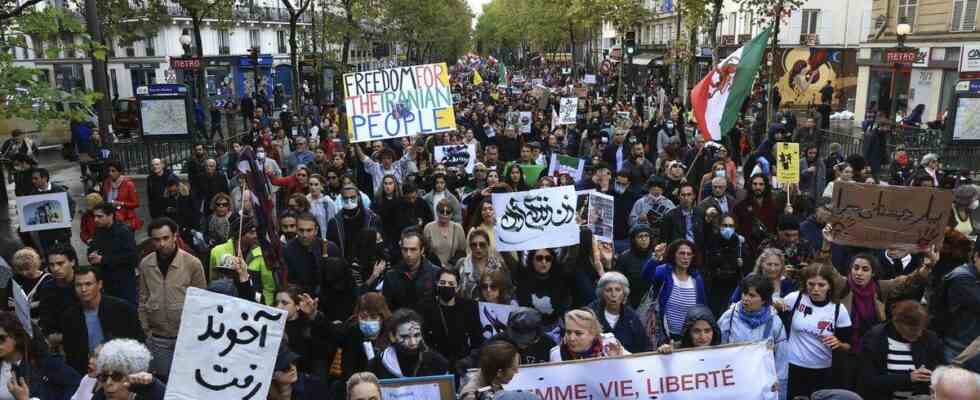The images go around the world. A wind of protest is sweeping over Iran, reaching the streets, schools and universities. An opposition movement carried by Iranian women who defy the Islamic Republic, at the cost of their lives. They remove and burn their veils, they organize rallies, they chant slogans hostile to the conservative regime such as “Death to the dictator” or emancipation such as “Woman, Life, Freedom”. They also lost their lives in the face of violent repression by the riot police, who also arrested notorious supporters of the rebellion such as the artist Hajipour, author of a song in favor of the demonstrations. The latter have become the most important in the country since that of 2019 against the rise in the price of gasoline.
This anger is fueled by the death of Mahsa Amini, a 22-year-old Iranian Kurd, arrested on September 13 by the morality police, judging that her veil did not cover her hair enough. Three days after her arrest, the young woman died in hospital in circumstances deemed suspicious by her family and activists, while the police deny any responsibility for her death and claim, according to a medical report, that she is linked to a disease of the brain and not by beatings.
“The first women’s revolution supported by men”
More than 4,200 kilometers from Tehran, how do Iranians living in France experience the situation? Bahra writes to us that she is “stressed out”. A feeling shared by many of our readers. Zahra is “crying” and “angry” at the news from there. But she remains full of “hope”, participates in as many demonstrations as possible even if she “wonders if it is of any use”. “I feel guilty when I see myself in such a free country, knowing my Iranian brothers and sisters ready to die for their freedom,” she confides to us.
Arman, Franco-Iranian, is also overwhelmed by sadness in front of the images “of young people who sacrifice themselves for the future of their country, of the limitless courage of women”. This 30-year-old salutes this “first female revolution in history, supported by men”. However, he said he was “deeply disappointed by the inaction of France, a country of human rights, of French feminists”. For this computer engineer, “an Iran at peace would guarantee lasting peace throughout the Middle East and the world”. Very active on the networks, he relays information, participates in mobilizations in France. “It is high time for this to change”, he believes, “after 40 years of the mullahs’ reign” resulting in “corruption, poverty, a lack of freedoms, murders”.
Difficult contact with their family
Beyond the physical and moral violence denounced by activists and NGOs and condemned by the international community, the Iranian regime has also imposed severe restrictions on access to social networks. Internet censorship that makes it difficult for Iranians to contact their relatives living in France. Arman fails to reach some of his relatives, while he has delayed news from others. Shaghayegh is also trying unsuccessfully to hear from his family in Iran, but “it’s impossible via FaceTime and WhatsApp”. Tara measures her luck to have succeeded because her family had the means “to pay for a VPN before the Internet was cut off”. “Those who can flee do so. Brain drain is a real problem in Iran,” she explains. She has also helped members of her family to be able to come and study in France and countless Iranian friends, encouraged by their parents, to leave the country for “a better life, more freedom, financial security , tranquility. A future “.
Despite her feeling of powerlessness, Tara participates in mobilizations to denounce the “seriousness of corruption”, the high cost of living and the domination of men. . “Justice does not exist in Iran”, she adds, as she lost two members of her family, enrolled at Azadi University, in a bus accident “without the culprit being sentenced “. For her, the Mahsa Amini affair is “the straw that broke the camel’s back”. “We must make the voices of the women who are there and who fight every day to live with dignity heard”, she underlines.
Erwan is also very worried about his family. Born of an Iranian father, this 30-year-old Frenchman shares testimonials and videos on social networks to make as many people as possible aware of the situation and hopes for greater resonance from the media coverage of the events. He remembers, thirteen years ago, having witnessed the attempted arrest of a young woman by the morality police. “Young people had created a crowd to help this woman escape in a crowd, but I remember the anguish of my cousin who was responsible for my little brother and me, and the anger of the people present”, details he.
Erwan is in favor of a return to power of the crown prince to the throne “but differently from before, a little in the spirit of the English monarchy”. Were conditions better in Iran before? According to the memories of Shore (or Emilie in French), Shirin’s mother, not really. This secretary, who arrived in France at the time of the revolution, found herself having to wear the veil overnight at the Iranian Embassy in order to be able to work. “She left the embassy overnight,” Shirin reports. His mother decided to settle permanently in France. Forty-three years later, she has still not set foot in Iran. “I constantly think of all those women who weren’t so lucky. In the following years, my whole family joined my mother in France and we are full French citizens,” she says.

